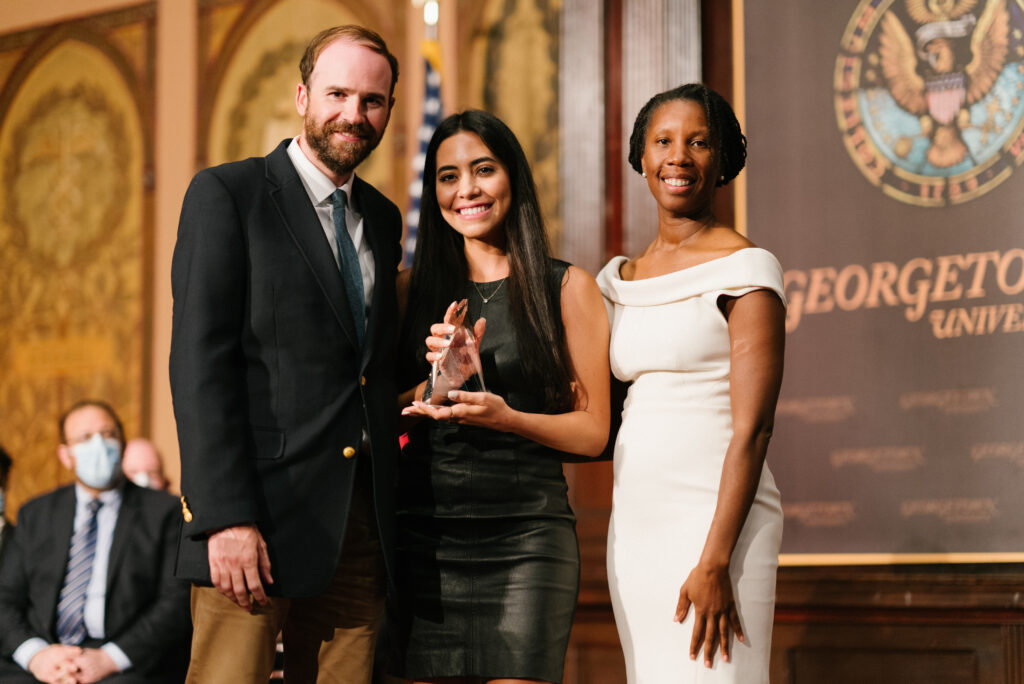In the last few weeks, I have struggled to find sensible words to use in response to the mass shootings in Uvalde, Texas and Buffalo, New York. I know that I am not alone in this feeling. Words feel unsatisfactory to the task of making sense of these hate-filled massacres. The pattern of mass violence is all too predictable in our national life: unimaginable death has been routinized and, as a consequence, a temptation sets in to become numb to the carnage and inert about making positive changes in the way we live as a collective.
So it might come as a shock to some that the resource that I’m going to these days is hope. Let me be clear at the beginning: I am not talking about a facile, saccharine, naïve hope that is based in wishful and unrealistic thinking. No, I am talking about the kind of critical hope that arises out of Georgetown’s Catholic and Jesuit tradition and the other religious traditions that have their home at this university. In the midst of this continuing cycle of despair and desolation about the now routinized cycles of senseless loss, I think that a bold and daring hope is what grounds me and can serve as a shared resource for all of us in these difficult days. Because hope is a virtue that extends beyond individual thoughts and actions and calls on everyone to share together in the work of healing, mercy, and justice.
Hope is especially important to name as it relates to our task as a university community in responding to the crisis of armed violence in the United States. The educational mission of Georgetown, grounded as it is in Catholic Social Teaching, reminds us that a just society balances rights, on the one hand, with responsibilities, on the other. We are responsible for one another and have a special obligation to the most vulnerable in our society. Our learning, teaching, and service at Georgetown invites us to evaluate how we are called to participate in the healing and restoration of the brokenness in our society and culture. How can we apply our learning and our professional gifts and talents to build a society that makes its members, especially its most marginalized, feel safe and welcomed?
The actions needed in a time like this are both small and large. In our daily lives and interactions, how can we instill the virtues of tenderness and compassion? How can we extend grace, forgiveness, and seemingly minor acts of charity in the day-to-day? How can we be more sensitive about the language we employ and consider how it is received by others? And in the larger work of structural change: how can we contribute to changes in law and policy that can help reduce the overall incidence of armed violence? What gifts, talents, and resources of our own can we add in a shared struggle for peace and justice in our country and throughout the world?
All of this talk of hope, as unexpected as it might seem these days, comes on the heels of two weekends of Commencement celebration at Georgetown. Dr. Shaun Harper invited the 2022 graduates of SCS to live into the continuation of hope as an antidote to the social ills that plague us. And this past weekend, both President DeGioia and Fr. Greg Schenden, S.J., Director of Campus Ministry, in the Baccalaureate Mass for the Class of 2020, called out the theme of hope from the Jesuit tradition of spirituality. President DeGioia, reflecting on a reading from St. Paul, invited the assembly to be witnesses to hope and consolation through all of the loss, pain, sadness, difficulty, and disruption. And Fr. Schenden, referring to the writing of the Jesuit historian Fr. John O’Malley, reminded the audience that our mission at Georgetown is to form people for others who serve as ministers of consolation. In a wounded and weary world, this is the kind of hope that we so desperately need.

